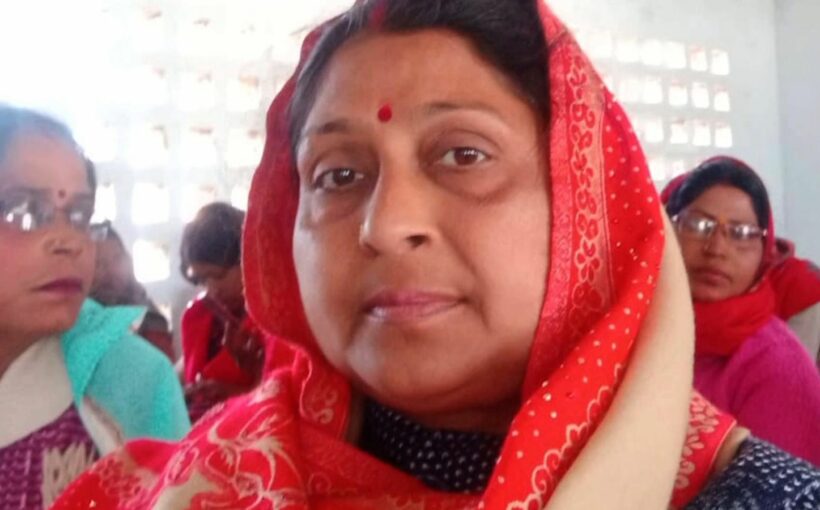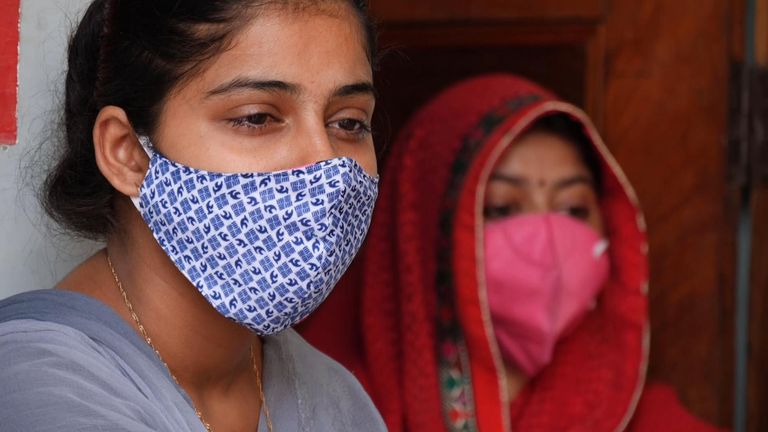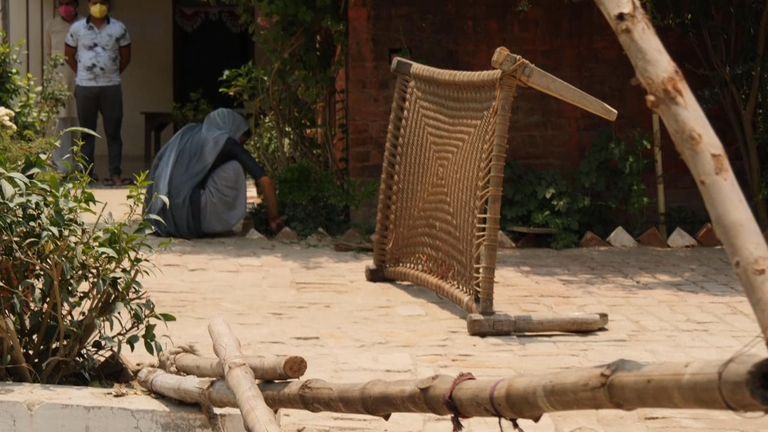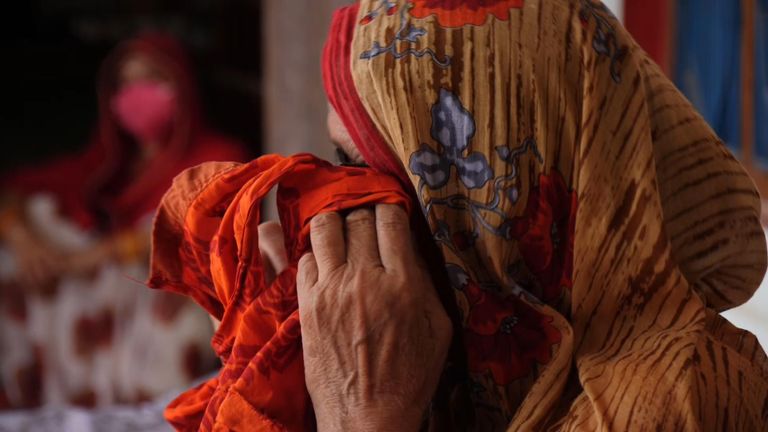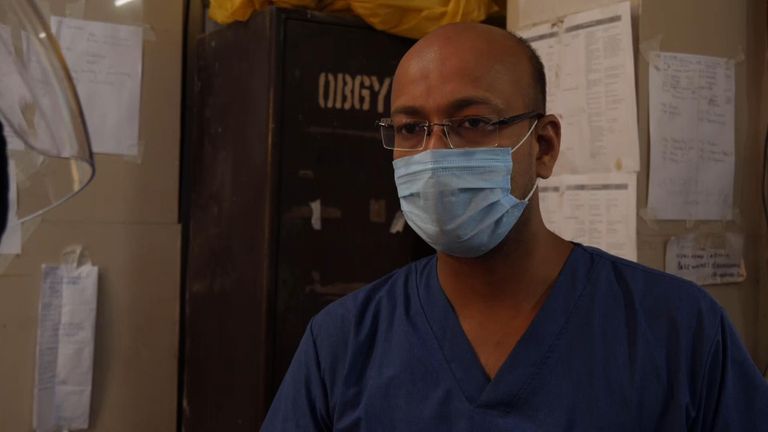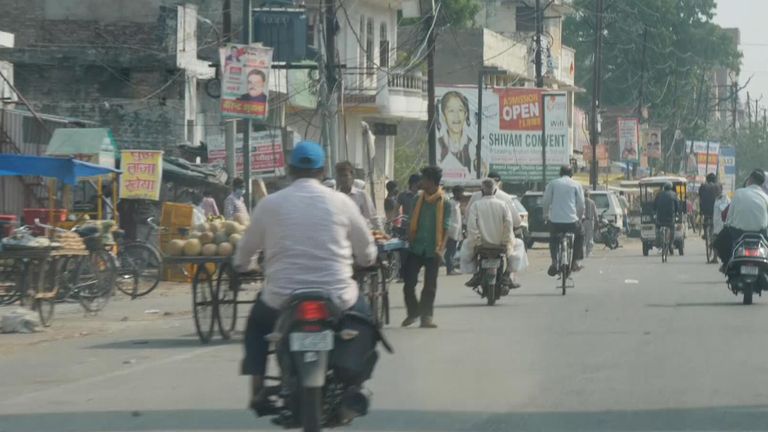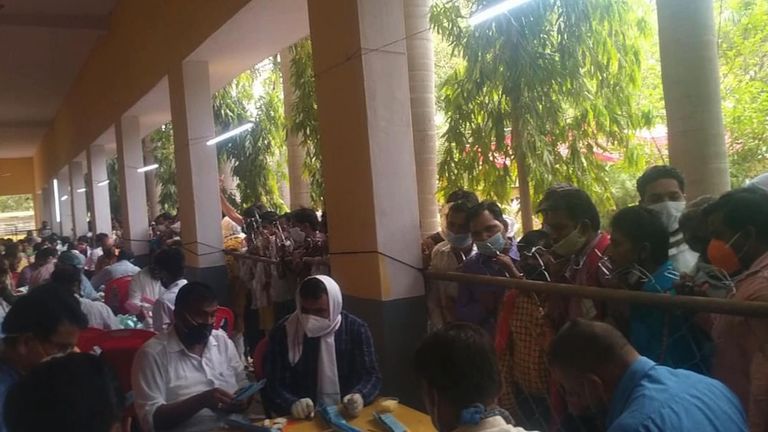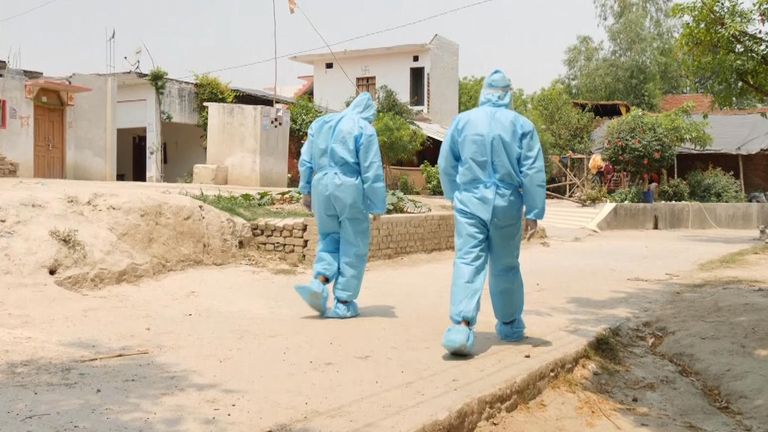The tragic consequences of pressing ahead with municipal and state elections across India at the height of the country’s second coronavirus surge, is only just becoming clear.
The Sky News team saw how the virus has ended up being transported back to rural and remote communities which have previously been largely free of the disease.
Twenty-year-old Divya Singh sobbed uncontrollably whilst telling us how she didn’t believe her mother needed to die.
Live COVID updates from the UK and around the world
“She kept on telling us it was her duty and she had to go or she would lose her job,” her daughter said, whilst cradling a photograph of her and her mother.
Her mother, Sarita is among more than 700 teachers in the state of Uttar Pradesh alone who died from coronavirus after being drafted in to run the local polls.
Teaching unions believe the figure is actually much higher as it only accounts for deaths up until the end of April.
Dinesh Sharma, president of the Uttar Pradesh Teachers Union, said: “We are still seeing 10-12 of our people dying every day. We think we’ve crossed well over 800 deaths now.”
He said the union made repeated attempts through the election authorities, the government and the courts to try to stop the elections being run during the pandemic.
“We asked the election authorities to stop the elections because we felt it would endanger our people’s lives – but we failed.”
The Election Commission instead ordered that strict COVID protocols should be enforced.
Pictures Sky News have been handed, which were taken at the elections, clearly show this didn’t happen.
Primary school teacher Sarita Singh was a mother of three and only 48 when she was called up to do her civic duty alongside other teams of civil servants for the voting in Uttar Pradesh.
This involved election training in mid-April with crowds of other teachers, followed by overseeing one of the voting days on 26 April.
By this stage, India had already begun registering global record daily infections.
Photographs taken by a number of teachers and given to us show all the voting queues very busy with few masks being worn.
Sarita was accompanied to the vote by her husband Raghubir but began to feel ill very soon after returning home to their village, Manikapur in Unnao District.
In less than a week her family was so worried about her condition that Raghubri drove her more than an hour away to the nearest hospital in Kanpur.
He took her to two separate hospitals but couldn’t get her admitted to either because she hadn’t had a coronavirus test and only COVID-positive patients were being admitted.
By the end of that day (3 May) she’d managed to take a rtpcr (coronavirus test) and there are pictures showing her getting some oxygen relief from a cylinder her family had managed to secure from relatives living hundreds of kilometres away.
She died at home in the early hours of the next morning. Her COVID test results only came back the day AFTER she passed away. It was positive.
When we travelled out to visit the Singh family, we found them barricaded inside their home.
Makeshift barriers had been set up to stop others from entering. They’d been marked as a house of death and disease.
Sarita was the first person in the village to have suffered and then died from the virus.
There are five other households in this small community who are now showing symptoms.
All the members of her own extended family have symptoms – that’s her 20-year-old daughter Divya, her eldest son, Anshuman, 29, and his wife Kunti.
Her husband, Raghubir, and middle son Harshraj, 26, have been told they are COVID-positive.
They both complained of breathing problems and weakness to us.
The others have all taken tests but after waiting nearly a week, still had no results back.
But whatever illness they are feeling, is far outweighed by their anger at Sarita being made to work at the elections.
“I told her not to go,” her husband told us. “Of course we are scared. Everyone is scared of this pandemic. Look at the way you guys are dressed. Everyone is scared,” he said. (We were wearing hazmat suits to enter the home).
Uttar Pradesh has a population the size of Britain, France and Germany combined, and has been one of the regions worst affected by coronavirus
But we were constantly staggered by the lack of anything resembling a lock down.
Shops and stalls were shuttered and closed but the streets and alleyways continue to be crowded with people.
Uttar Pradesh is traditionally one of the heartlands of support for the governing BJP party but now Prime Minister Narendra Modi is facing criticism both at home and abroad for focussing on the polls rather than the pandemic.
He personally led a lot of the campaigning in the state elections (outside Uttar Pradesh).
He regularly addressed mass political rallies which drew tens of thousands of supporters.
His whole cabinet was involved, organising political roadshows for mostly unmasked and huge crowds.
His enemies have complained this insistence in holding political rallies right up until 21 April meant the elections became super-spreading events of enormous proportions.
The actual full consequences probably won’t be known for years as the virus takes a hold in far-flung and small communities with little ready access to health facilities.
Sarita’s family feels bitter, frustrated and full of sorrow. Her mother Kamla Singh wept whilst saying to us “I kept telling her not to go. I said to her many times: ‘Don’t go into the pandemic, my love’.
“But she said: ‘They’ll file police charges against me if I don’t do my duty’.”
Her young daughter Divya had tears rolling down her cheeks as she told us: “My mother was our rock, our family’s foundation. Today is her birthday and Mother’s Day. We should be celebrating her. Instead we are talking of her leaving our world.”
Her brother touched her face gently, his own voice cracking. “Don’t worry. Don’t cry,” he told her, “We will celebrate mummy’s birthday next year.”
Their sorrow and their loss is being replicated by tens of thousands of families across this huge country – with many bitter and anger at how unprepared they’ve been as a nation for this virulent second wave.
Source: Read Full Article
